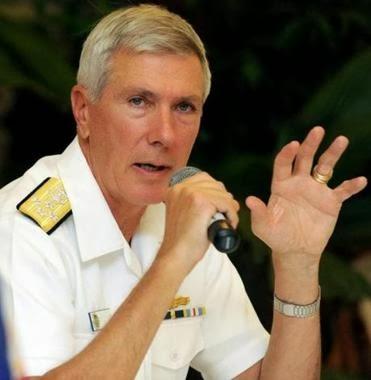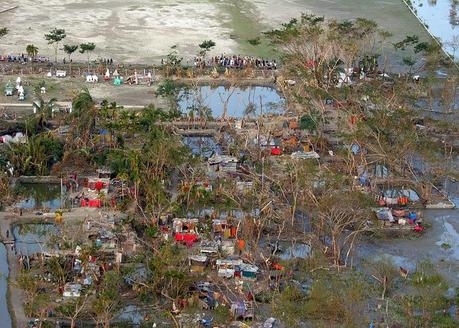 According to the Commander of U.S. Forces Pacific (PACOM), significant upheaval related to the warming planet “is probably the most likely thing that is going to happen . . . that will cripple the security environment, probably more likely than the other scenarios we all often talk about."Admiral Samuel Locklear had a meeting the other day with national security experts at Tufts and Harvard. After this session, he met with a reporter who asked him asked what the top security threat was in the Pacific Ocean. Rather than highlighting Chinese ballistic missiles, the new Chinese Navy aircraft carrier, North Korean nuclear weapons, or other traditional military threats, Admiral Locklear looked to a larger definition of national security.Locklear commented that “People are surprised sometimes” that he highlights climate change — despite an ability to discuss a wide-range of threats, from cyber-war to the North Koreans. However, it is the risks — from natural disasters to long-term sea-level rise threats to Pacific nations that has his deepest attention.“You have the real potential here in the not-too-distant future of nations displaced by rising sea level. Certainly weather patterns are more severe than they have been in the past. We are on super typhoon 27 or 28 this year in the Western Pacific. The average is about 17.”Climate Change merits national security — military — attention for very pragmatic reasons. The ice is melting and sea is getting higher,” Locklear said, noting that 80 percent of the world’s population lives within 200 miles of the coast. “I’m into the consequence management side of it. I’m not a scientist, but the island of Tarawa in Kiribati, they’re contemplating moving their entire population to another country because [it] is not going to exist anymore.”And, Admiral Locklear is now — almost certainly with Joint Chiefs of Staff and Office of Secretary of Defense knowledge and support — taking this up seriously with other nations.“We have interjected into our multilateral dialog – even with China and India – the imperative to kind of get military capabilities aligned [for] when the effects of climate change start to impact these massive populations,” he said. “If it goes bad, you could have hundreds of thousands or millions of people displaced and then security will start to crumble pretty quickly.’’
According to the Commander of U.S. Forces Pacific (PACOM), significant upheaval related to the warming planet “is probably the most likely thing that is going to happen . . . that will cripple the security environment, probably more likely than the other scenarios we all often talk about."Admiral Samuel Locklear had a meeting the other day with national security experts at Tufts and Harvard. After this session, he met with a reporter who asked him asked what the top security threat was in the Pacific Ocean. Rather than highlighting Chinese ballistic missiles, the new Chinese Navy aircraft carrier, North Korean nuclear weapons, or other traditional military threats, Admiral Locklear looked to a larger definition of national security.Locklear commented that “People are surprised sometimes” that he highlights climate change — despite an ability to discuss a wide-range of threats, from cyber-war to the North Koreans. However, it is the risks — from natural disasters to long-term sea-level rise threats to Pacific nations that has his deepest attention.“You have the real potential here in the not-too-distant future of nations displaced by rising sea level. Certainly weather patterns are more severe than they have been in the past. We are on super typhoon 27 or 28 this year in the Western Pacific. The average is about 17.”Climate Change merits national security — military — attention for very pragmatic reasons. The ice is melting and sea is getting higher,” Locklear said, noting that 80 percent of the world’s population lives within 200 miles of the coast. “I’m into the consequence management side of it. I’m not a scientist, but the island of Tarawa in Kiribati, they’re contemplating moving their entire population to another country because [it] is not going to exist anymore.”And, Admiral Locklear is now — almost certainly with Joint Chiefs of Staff and Office of Secretary of Defense knowledge and support — taking this up seriously with other nations.“We have interjected into our multilateral dialog – even with China and India – the imperative to kind of get military capabilities aligned [for] when the effects of climate change start to impact these massive populations,” he said. “If it goes bad, you could have hundreds of thousands or millions of people displaced and then security will start to crumble pretty quickly.’’
BANGLADESH (Nov. 24, 2007) An aerial view of damage to villages and infrastructure following Cyclone Sidr,which swept into southern Bangladesh Nov. 15. The amphibious assault ship USS Kearsarge (LHD 3), as well aselements of Amphibious Squadron 8 and the 22nd Marine Expeditionary Unit (MEU) Special OperationsCapable (SOC) arrived off the coast of Bangladesh Nov. 23 to support ongoing disaster relief operations.
The Pacific region has seen some of the largest multi-national disaster relief operations. Operation Sea Angel in 1991, following a devastating typhoon on Bangladesh, involved numerous military forces — including the Chinese Navy. Similarly, many nations used military forces to respond across the Indian Ocean to the disastrous December 2004 Aceh Tsunami. Admiral Locklear is looking to the reality of mounting seas, more damaging severe weather, and looking to other climate impacts — and is working to set the stage for the region’s military forces to work together more effectively in responding to climate disruption driven disasters.This interview is not an isolated comment by Admiral Locklear but an indication of increasing concern about and focus on climate change. In December 2012, he raised climate change in a speech to the Asia Society. From this speech highlighting the importance and complexity of the Pacific region. His first example of a non-region specific complicating issue: this complexity is magnified by a wide, diverse group of challenges…challenges that can significantly stress the security environment…. – Climate change – where increasingly severe weather patterns and rising sea levels will threaten our peoples and even threaten the loss of entire nations…and of course the inevitable earthquakes and tsunamis will continue to challenge all of us in a very unpredictable way as our planet ages. Just as today our friends and partners in the Philippines are dealing with the challenges of the most recent super typhoon.Admiral Locklear spoke a month ago to the U.S. Indonesia Society. In the speech, he linked climate change to the military, the need for resiliency and the ability for coping with mounting disaster relief requirements. As Indonesia’s capabilities grow, the Indonesian military should also build on its tradition of contributing forces to U.N. peacekeeping operations…yet another area where the Indonesian and American militaries can collaborate more closely to increase the level of interoperability between our forces.While resilience in the security environment is traditionally understood as the ability to recover from a crisis, using the term in the context of national security expands its meaning to include crisis prevention.With large populations vulnerable to the effects of climate change and natural disasters, both our nations have a significant interest in improving our ability to quickly respond and mitigate the ongoing risk these threats bring.We learned how local communities prepare themselves for the inevitable disruptions are critical to the region’s efforts to maintain peace, security and prosperity. This means working on disaster response alone is no longer the answer for the types of scenarios that we face. Disaster risk reduction through mitigation, planning, and recovery that starts at the community level is required if we are to create more resilient societies. Private businesses and communities must look within and beyond their current capabilities to ensure that they are prepared to handle what may occur as a result of some catastrophe.Admiral Locklear as a strong voice on climate change issues might surprise some. Consider, for example, the range of Combatant Commander formal statements to Congress as to the discussion of climate change. Writ large, not much there — and Admiral Locklear is no exception in that list. Admiral Locklear has mentioned climate change before, such as commenting that it would be a stress factor in Europe (where he commanded Operation Odyssey Dawn, the attack on Qaddafi’s Libya during the Arab Spring). That Admiral Locklear is putting climate change on the top of the long-term security challenge seems to be new — to be news.That a four-star flag officer is publicly stating that climate change dominates the long-term strategic discussions in his command matters. It matters for the substance of discussion with other nations and for what this might portend for the highest levels of the U.S. military. (Sadly, there are reasons to expect the (older) uniformed military to be strongly climate denial — having a 4-star speak different can impact this.) It perhaps is most important because the military is a path toward serious cultural change as to a broader acceptance of the basic reality of climate change. Who ‘listens’ when someone in uniform speaks? For me, the military is one of the key institutions for changing Americans perspectives on clean energy and climate change.
